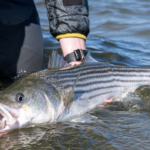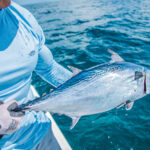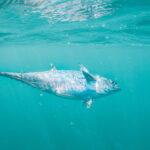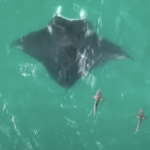
Talkin’ Striped Bass Spawn Dynamics
Consistent spawning production is paramount to a fishery’s long-term health. Many environmental factors are suspected
Why is it that saltwater anglers are so hesitant to share data with fishery managers—why are managers hesitant to work with the angling community for better data? Both sides need to come together for the good of our fisheries.
This question is a timely one, as recreational angling effort has arguably never been greater or more efficient, yet recreational data gathering efforts are lagging. The federal survey tools we rely on are effective at identifying coast-wide trends and effort shifts, but they are not as well-equipped to meet the demands of spatial management or a rapidly expanding and dynamic recreational fishing sector. Throw in the fact that climate change is having disruptive effects on marine ecosystems and fisheries management, and the future for increasingly popular saltwater recreational fisheries becomes somewhat bleak.
Unfortunately, too many in recreational angling communities seek to address these shortcomings with more flexibilities or prioritizing short-term harvests over long-term sustainability—largely because the status quo is easier for many anglers to communicate and digest. Here at ASGA, however, we want to guide the recreational sector towards a durable, effective solution and to instill a sense of responsibility in every saltwater recreational angler to be better stewards of these shared resources.
It’s a common trope heard around fishery management discussions—why is it such common practice for most hunters to religiously report their harvests, but then similar reporting is almost universally opposed in saltwater fishing? Let me posit a couple thoughts. First, admittedly, it is far easier to count terrestrial animals than marine (often migratory) fish and likely easier for states to conduct harvest tag programs than a coastwide or regional management body. I mean it’s simply easier to monitor and enforce 10 deer harvests than 100 fish, as an example.
However, I think the hesitation to adopt more catch/harvest reporting in saltwater fisheries stems from a different and far more concerning issue. There is a strong misconception in saltwater fisheries that the ocean is endless, that neither fishing effort nor fisheries management have any impact on marine fish stocks, and the numbers produced by fisheries scientists are not to be trusted. The solution is for all parties to come together in the interest of better data and abundant fisheries.
I know some of those misconceptions may seem like lunacy to many of our ASGA readers, but it is far too present in these discussions. Thankfully, the old guard of fisheries that prided themselves by sinking boats due to killing so many fish is being replaced by a younger generation that knows nothing about that gluttonously abused abundance, but they do know that conservation and environmental stewardship are important.
So, let’s return to the opening question: how much personal responsibility would you assume to ensure that our fisheries remain sustainable and abundant for generations to come? In many fisheries these days, the recreational sector accounts for a large percentage of removals—both through direct harvests and fish that are assumed to die after being released.
Would you share how many fish you caught, kept, or released each trip with fishery managers if you knew the data would be used for better management? Would you record lengths and release condition of fish you choose to throw back? Would you punch harvest tags for some fish that you’d like to keep and share a meal with friends and family but maybe encounter with less frequency? What if you knew that this information could drastically improve stock assessments and fisheries managers’ ability to manage these shared fisheries resources effectively AND sustainably?
Well, that’s where we are today. Our access to technology is so great in everyday society and in the fishing industry, yet fisheries management and fishing communities have hesitated to adopt such technologies to answer these essential questions in management. (Insert your four-letter word of choice), we don’t even know how many saltwater recreational anglers there are!
It’s time that we, as conservation-minded recreational anglers, acknowledge our profound impact on fisheries and assume more responsibility to become trusted stewards of these shared resources. There are several initiatives developing at Fishery Management Councils (South Atlantic and Mid-Atlantic Fishery Management Council) that would place an increased responsibility—yes, a burden also—on recreational anglers, but these sacrifices are a small price to pay to enjoy and access our shared fisheries resources. Also, ASGA has spent the past several months developing a new tool to fill key data gaps for fisheries management and stock assessments. Stay tuned for updates on those developments! Thank you for reading and lets all do our part in 2023 to become trusted stewards of saltwater recreational fisheries and partners with fishery managers across the country.

Consistent spawning production is paramount to a fishery’s long-term health. Many environmental factors are suspected

While the ASGA team is extremely proud of the community we’re building with the Guide

Feature Image: A false albacore being landed off Jupiter Florida by the Cheeky Fishing team,

Feature Photo: “Best Practices for Fishing Cobia Around Manta Rays” The Florida Manta Project is
We rely on our members and donations to keep fighting for a sustainable tomorrow in marine conservation.
By using this website, you agree to our use of cookies. We use cookies to provide you with a great experience and to help our website run effectively. To learn more, please review our privacy policy.
2 Responses
I would be willing to report fish that I harvest as well as release. I also feel it’s important for catch and release anglers to know mortality rates ….and consider different methods to increase survival rates